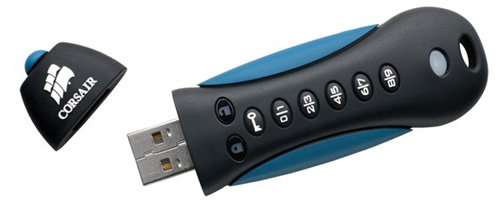Corsair USB Padlock 2 Has 256-bit AES, Keypad
Flash drives are great for toting around data, but they can also be easy to lose. While those worried about security can use a third-party encryption software to keep things locked down, Corsair makes it easier than ever with its Flash Padlock 2 USB flash drive.
The Flash Padlock 2 employs a user-definable PIN code that is entered using the integrated numeric keypad to unlock the drive and access the data. The data is secured by a 256-bit AES data encryption and cannot be compromised by disassembling the drive to gain access to the flash ICs.
The built-in nature of the keypad is handy for those who want to access the data without running external software. This could be useful when plugging the USB stick into a consumer device such as a TV or game console. If one should forget his or her password, there is software to completely reset the drive to a blank state.
“USB flash drives are the floppy disk of the 21st century, and their capacity and convenience allows us to carry our lives with us wherever we go,” stated John Beekley, Vice President of Technical Marketing at Corsair. “The Flash Padlock 2 provides valuable protection against loss of personal or corporate data as well as identity theft, allowing us to carry the most personal of data with complete peace-of-mind, and in a rugged, portable, convenient format.”
The Flash Padlock 2 has a capacity of 8GB and will retail for around $60.
Get Tom's Hardware's best news and in-depth reviews, straight to your inbox.
-
zoemayne wow thats a good price for that level of security. I have a 16gb corsair like this one pictured and the chip came out of the rubber casing it seems to have been poorly glued to the rubber casing....Reply -
hakesterman What in the Heck would you ever put on a thumb drive that you would need to secure it ???? WTFReply
-
bison88 ^Reply
Government Whistler blower data out of the Federal buildings? LOL I honestly have no idea buts is still pretty cool :D -
superblahman123 hakestermanWhat in the Heck would you ever put on a thumb drive that you would need to secure it ???? WTFReally? You asked that? You mean to tell me you don't see the worth of being able to move information off of a hackable platform and onto a media that is guaranteed to be only accessible via password?Reply
Really?... Come on now... -
rick2689 I don't see the point of 'securing' these flashdrives. If someone wants to see your private data they'll find a way to somehow. I mean c'mon...if someone has possession of your drive it's only a matter of time before they get what they want. If you want to keep sensitive data find a proprietary method of storing it. Use a 5 1/4 inch floppy. That'll show em'Reply -
the_krasno rick2689I don't see the point of 'securing' these flashdrives. If someone wants to see your private data they'll find a way to somehow.Reply
I respectfully disagree: there is a reason why the nuke launch codes were never stolen!
-
rick2689 the_krasnoI respectfully disagree: there is a reason why the nuke launch codes were never stolen!Reply
I don't follow you...Which nuke codes? Did anyone have them on their person? What's your argument? :) Just trying to understand where you're coming from. Please elaborate. -
redplanet_returns hakestermanWhat in the Heck would you ever put on a thumb drive that you would need to secure it ???? WTFReply
u won't say that if u plan to transfer sensitive materials (interpret it however u want :)), and lost the drive. -
redplanet_returns rick2689I don't follow you...Which nuke codes? Did anyone have them on their person? What's your argument? Just trying to understand where you're coming from. Please elaborate.Reply
i don't know how nuke codes are stored...but from my out-dated knowledge of AES, it's practically unbreakable (takes a ridiculous amount of time/tries to crack to be feasible) with computer equipments affordable to most people today. -
rick2689 But can't you just take the memory chip out and read it manually by soldering it on another circuit board? Hmm.Reply

